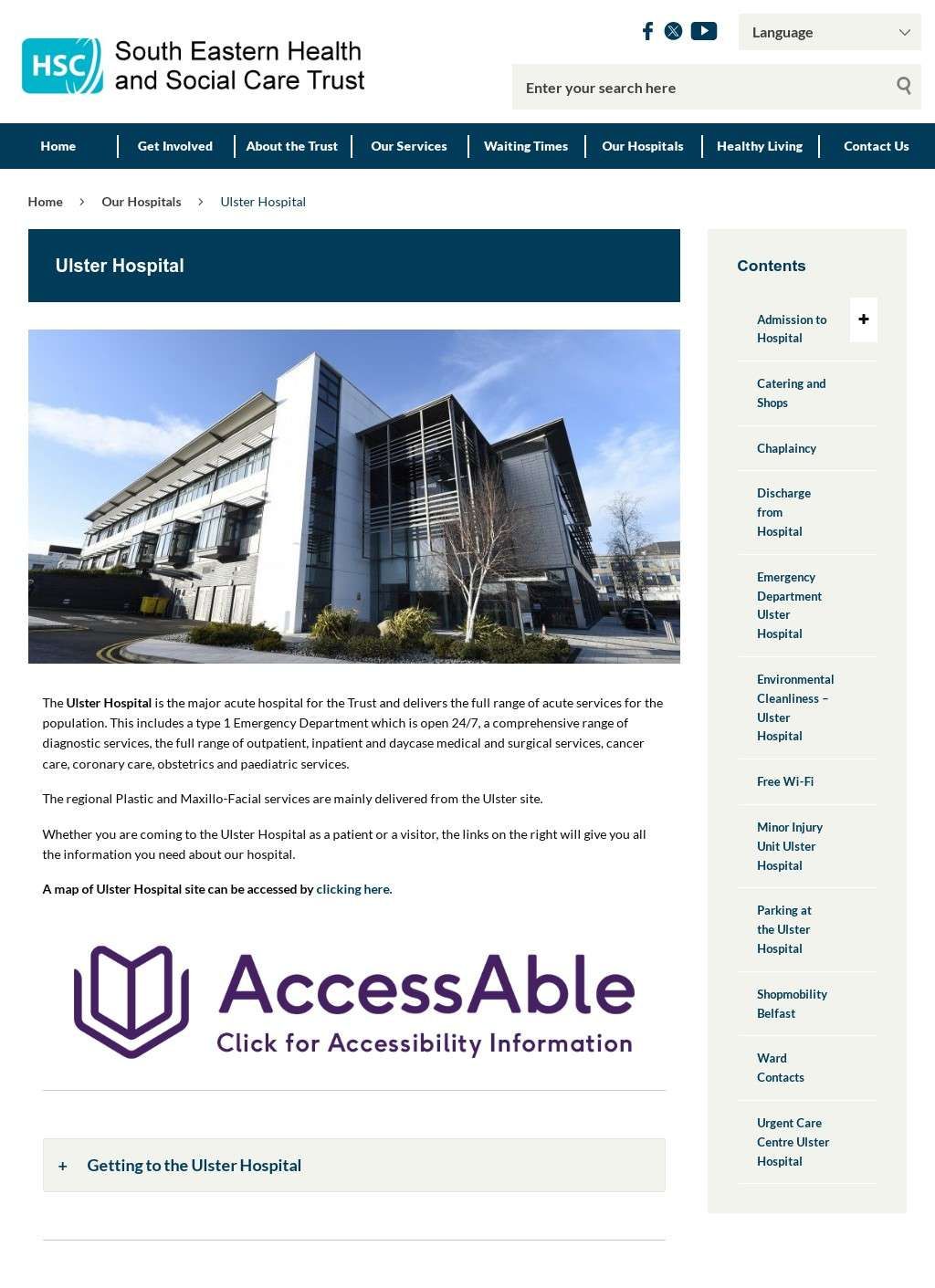The Ulster Hospital occupies a pivotal position in Northern Ireland's healthcare landscape, serving as the major acute hospital for the South Eastern Health and Social Care Trust. Located in Dundonald on the eastern edge of Belfast, this sprawling medical complex provides vital services to residents across County Down, the Ards Peninsula, North Down, and parts of Belfast. With roots stretching back to 1962, the hospital has evolved from a modest district facility into one of Northern Ireland's busiest acute hospitals, treating hundreds of thousands of patients annually through its emergency department, outpatient clinics, and specialist units.
At the heart of the Ulster Hospital's services lies its Type 1 Emergency Department, operating round the clock to handle everything from minor injuries to major trauma cases. The department sees over 80,000 patients yearly, making it one of the busiest in Northern Ireland. Specially trained emergency medicine consultants, nurses, and support staff work in state-of-the-art facilities equipped to handle complex medical emergencies. The department includes dedicated paediatric emergency areas, resuscitation bays, and rapid assessment units designed to streamline patient flow and reduce waiting times during peak periods.
Surgical excellence defines much of the Ulster Hospital's reputation, with teams performing thousands of operations annually across multiple specialties. The hospital houses Northern Ireland's regional plastic surgery and maxillofacial units, drawing patients from across the province for reconstructive procedures, burns treatment, and complex facial surgery. General surgery, orthopaedics, urology, and ENT departments handle everything from routine procedures to complex cancer operations. Modern operating theatres equipped with advanced imaging technology enable minimally invasive procedures that reduce recovery times and improve patient outcomes.
The hospital's medical services encompass a comprehensive range of specialties treating conditions affecting every organ system. Cardiology units provide advanced diagnostics and treatments for heart disease, including cardiac catheterisation and electrophysiology studies. Respiratory teams manage complex lung conditions using the latest therapies and rehabilitation programmes. The stroke unit offers rapid assessment and clot-busting treatments that can dramatically improve outcomes for stroke patients. Elderly care services recognise the complex needs of older patients, providing specialist assessment and rehabilitation to maintain independence.
Maternity services at the Ulster Hospital support thousands of families yearly through pregnancy, birth, and early parenthood. The consultant-led unit includes delivery suites, a midwife-led unit for low-risk births, and neonatal intensive care facilities for premature or sick babies. Antenatal clinics monitor pregnancies from early stages through to delivery, whilst specialist services support women with complex medical conditions or previous pregnancy complications. The hospital's commitment to family-centred care shows in facilities designed to keep families together during challenging times.
Cancer services represent another crucial aspect of the Ulster Hospital's work, with multidisciplinary teams providing diagnosis, treatment, and support for various cancer types. The hospital works within the Northern Ireland Cancer Network to ensure patients receive timely access to surgery, chemotherapy, and radiotherapy. Specialist nurses provide invaluable support throughout the cancer journey, coordinating care and offering emotional support to patients and families. Palliative care services ensure comfort and dignity for those with advanced disease.
Diagnostic services underpin all clinical work at the Ulster Hospital, with radiology departments operating sophisticated scanners including MRI, CT, and PET-CT machines. Laboratory services process millions of tests annually, providing crucial information for diagnosis and treatment monitoring. The imaging department operates extended hours to support emergency and inpatient care, whilst also managing thousands of outpatient appointments for planned investigations. These services have expanded significantly with investment in new equipment and facilities.
Teaching and research form integral parts of the Ulster Hospital's mission. As a university teaching hospital affiliated with Queen's University Belfast, it hosts medical students, nursing students, and trainees from allied health professions. The undergraduate sub-deanery coordinates educational programmes that prepare the next generation of healthcare professionals. Research activities span basic science through to clinical trials, with staff contributing to advances in medical knowledge that benefit patients locally and globally.
Recent years have seen substantial investment in the Ulster Hospital's infrastructure, transforming both the physical environment and service capacity. A major redevelopment programme delivered new emergency department facilities, critical care units, and ward blocks designed to modern healthcare standards. The new buildings incorporate single rooms to enhance privacy and reduce infection risks, whilst therapeutic design elements create more pleasant environments for patients and staff. These improvements support the hospital's ability to handle growing demand whilst maintaining high care standards.
Patient experience remains a key priority, with various initiatives aimed at improving comfort, communication, and outcomes. Volunteer services provide practical support and companionship, particularly valuable for elderly patients or those without local family support. Patient feedback systems capture experiences and drive continuous improvement in services. The hospital's location presents parking challenges, addressed through park-and-ride services and improved public transport links that help patients and visitors access the site.
The Ulster Hospital faces ongoing challenges common to healthcare systems worldwide: rising demand, workforce pressures, and resource constraints. Winter pressures particularly test capacity, with flu outbreaks and increased elderly admissions stretching services. Despite these challenges, dedicated staff maintain their commitment to providing high-quality care. The hospital's website provides extensive information for patients and visitors, including department locations, visiting times, parking information, and preparation instructions for various procedures and appointments. Contact numbers for all departments enable direct communication when needed.
